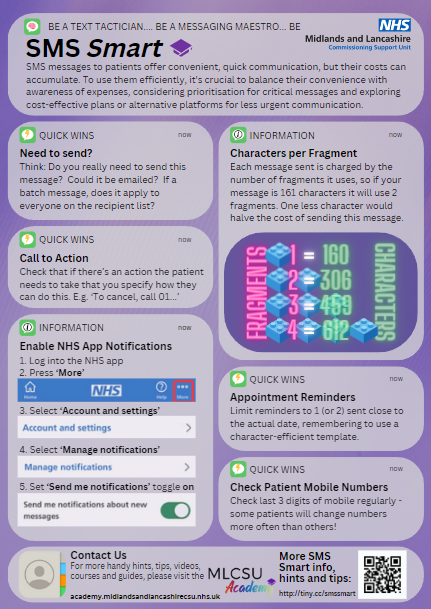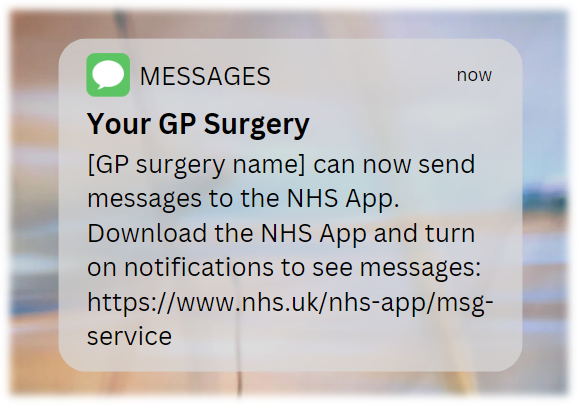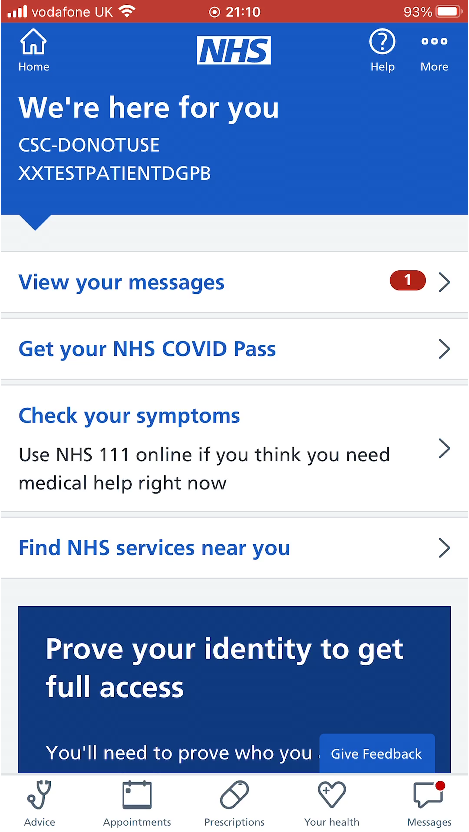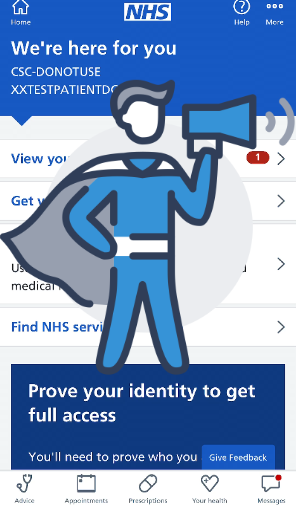SMS Smart

Click here to download the PDF guide to print out for easy reference: SMS Smart A4 Poster (PDF)
SMS messages to patients offer convenient, quick communication, but their costs can accumulate. SMS costs across Cheshire and Merseyside ICB alone are currently in the region of £650,000. To use them efficiently, it's crucial to balance their convenience with awareness of expenses, considering prioritisation for critical messages and exploring cost-effective plans or alternative platforms for less urgent communication.
This guide covers messaging and the NHS App. For Emis specific settings to enable patient facing services, please see our guide to Promoting the NHS App - Primary Care Access Recovery Plan.
Fragments, characters and cost
Each SMS message sent is charged by the number of fragments it uses, and each fragment is made up of a set number of characters (see table below), so if your message is 161 characters it will use 2 fragments. One less character would halve the cost of sending this message.
| Fragments | Characters |
| 1 | 160 |
| 2 | 306 |
| 3 | 459 |
| 4 | 612 |
 An example SMS message to inform patients, 158 characters (1 fragment)
An example SMS message to inform patients, 158 characters (1 fragment)
Non-standard characters
Don’t use non-standard characters
If you use anything that isn’t a GSM 03.38 character*, your fragments drop to a limitation of being 70 characters long, meaning a 150 character message will cost 3 fragments rather than 1 if you had used standard characters. Non-standard characters include emojis 😥, so avoid messages with these in.
*What's a GSM 03.38 character? Basically anything lower or upper case in English, along with the symbols along the top of your keyboard (!, ", £, etc) and a few more.
Click here for more info: https://en.wikipedia.org/wiki/GSM_03.38
Quick Wins
⚡Need to send?
Before you click send, think:
- Do you really need to send this message? - Is it the best medium for relaying this information, or is there a better way? Is the message purely for information, or is there a 'call to action' for the receiving patient (see below). Research shows that over-messaging leads to digital apathy - patients simply stop reading the messages.
- Could it be emailed? Would the information be better as an email that can be replied to, where you can attach documents or more easily and efficiently link to external documents (Patient Information Leaflets, for example) without having to consider the limitations of SMS messaging?
💡 If sending links to external documents / forms, ensure that any content linked from your message remains accessible for the required duration. - If a batch message, does it apply to everyone on the recipient list? An example might be to message patients to warn them of a temporary reduction in the number of car parking spaces over the next week - this doesn't need to be sent to all registered patients, but should be to those with an appointment booked within this period.
⚡Call to action
Check that if there’s an action the patient needs to take that you specify how they can do this. E.g. ‘To cancel, call 01...’ or 'to discuss these results please contact the surgery after 2pm, Mon-Fri', etc.
If there is no 'call to action', consider whether or not the message is best sent as an SMS or via another method (see above).
⚡Appointment Reminders
Research shows that the most effective appointment reminders are limited to 1 (or 2) sent close to the actual date, remembering to use a character-efficient template so that all the critical bits of information are included (using the least number of characters / fragments).
⚡Check patient mobile numbers
Check the last 3 digits of the patient's mobile phone number regularly - some patients will change numbers more often than others!
💡 TIP: Think about your registration process
Do you include mobile number as a standard question on your registration form?
It's also worthwhile to periodically check email addresses too.

From a training perspective, the most important thing is to ensure your front-line staff are well-prepared to address inquiries and resolve issues related to the service.
Encourage them to actively promote this service to patients and emphasize the importance of patients downloading the NHS App. By equipping your front-line staff with the necessary knowledge and encouraging advocacy, you contribute to a smoother user experience and increased adoption of the NHS App among patients.
Please also see the section on becoming an NHS App Ambassador
In short, the NHS App enables patients to:
- get health advice using the health A-Z on the NHS website
- find out what to do when they need help urgently using NHS 111 online
- choose your organ donation preferences
- choose whether the NHS uses your data for research and planning
- show others the details of your COVID-19 vaccine (or vaccines) when travelling abroad
- find NHS services nearby
Additionally, if patients register and prove who they are, they can:
- order repeat prescriptions and view, set or change change their nominated pharmacy
- view their GP health record securely
- manage their first hospital or clinic appointment with a specialist, if referred through the NHS e-Referral Service (e-RS)
- sign up for updates about participating in health research
NHS App Messaging
The NHS App messaging service provides a secure inbox that will allow patients to start receiving messages from health and care services such as their GP surgery via the NHS App, instead of traditional channels like SMS (text message) or letter.
💬 Think of it like WhatsApp - free to send messages, without the character limitations of SMS
Patients will get a notification from the NHS App when they receive a message in their secure inbox, if they have notifications enabled on their device. Notifications preferences may take 24 hours to take effect. Over time, as well as GP surgeries, other health care services such as the national COVID vaccine service, or local community services, will use the NHS App to send messages to their patients. We hope that eventually it will be the main way that patients registered with a GP surgery in England receive their healthcare messages.
Benefits to staff, patients and the wider NHS:
Please note: NHS App Messaging enables the surgery to communicate directly to patients, and is different to other forms of messaging available through the NHS App:
- GP surgery messaging (IM1 PFS messaging where patients can contact the surgery)
- Care / Online Consultation request or 'ask your GP surgery a question'
- consultations, events and messaging (available through personal health record like Patient Knows Best)
Enabling NHS App messaging notifications
It's quick and simple for patients to enable in-app messaging within the NHS App:
- Log in to the NHS app.
- Go to More.
- Select Account and settings.
- Then select Manage notifications.
- Use the toggle to turn notifications on or off.

💡 Remember: If patients enable in-app messaging notifications, direct messages
to patients are sent for free rather than using your SMS allowance
NHS App notifications can be received by patients from a variety of providers (AccuRx, iPlato, Patchs, etc) - please check with your own supplier for more details. Many providers include the functionality to convert unread NHS App messages to SMS after a set period, so that patients don't miss these messages coming through. AccuRx, for example, will convert any unread NHS App messages to an SMS and resend after 3 hours.
Click here for more information about enabling NHS App messaging notifications:
Promotional Materials
There are a range of promotional materials for GP Surgeries (and patients) available here:
https://digital.nhs.uk/services/nhs-app/toolkit
NHS App Ambassadors

Further Support
Please contact your practice's designated MLCSU IT Trainer (or email mlcsu.academy@nhs.net) for more information, and to discuss bespoke support for your practice's journey with the NHS App
